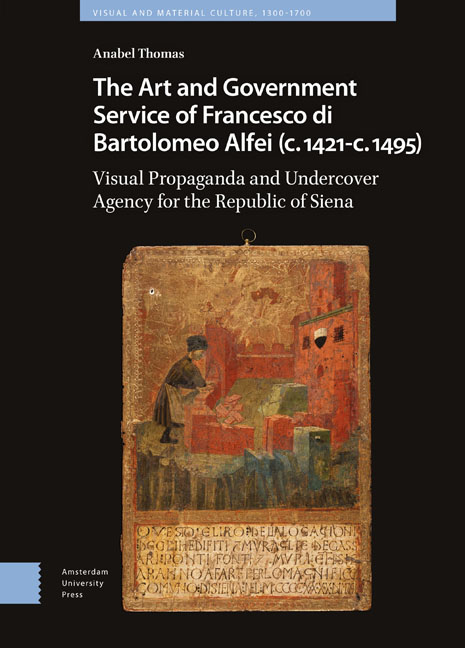 The Art and Government Service of Francesco di Bartolomeo Alfei (c.1421-c.1495)
The Art and Government Service of Francesco di Bartolomeo Alfei (c.1421-c.1495) Published online by Cambridge University Press: 24 November 2023
Abstract: This chapter considers Francesco di Bartolomeo Alfei's family and his early access to officials in central government through the office of the Biccherna (chancellery of finance) and his father-in-law Meo di Lorenzo: contrasting the advantages of this with professional openings available through networking within his own artistic community, including receiving the commission from the Fraternita di Santa Maria degli Angeli e Compagnia di San Francesco. The workshop relationship established between the young artist, Giovanni di Paolo and Sano di Pietro in the ambit of the Biccherna, the Cathedral Works and the Franciscan conventual complex is outlined, along with an analysis of two panels associated with the church of San Francesco in Grosseto, variously attributed to Sano di Pietro, Francesco di Bartolomeo Alfei and the ‘Maestro dell’Osservanza’.
Keywords: neighbourhoods and networks; family relationships; Sano di Pietro; ‘Maestro dell’Osservanza’; government offices; the Biccherna.
Recent research has endowed Francesco di Bartolomeo Alfei with much greater stature and significance than that allotted to him by the nineteenth-century historians considered in Part One. This is in part due to the proposal put forward by Cecilia Alessi and Piero Scapecchi in 1985 that Francesco di Bartolomeo Alfei's name should be considered in the context of one of the most discussed and still challenging art historical debates concerning fifteenth-century Sienese art: authorship of the Birth of the Virgin altarpiece in Asciano. However, further findings by Maria Falcone switched art historical debate away from the spotlight on Francesco di Bartolomeo Alfei, concentrating attention instead on his contemporary (and possible master), Sano di Pietro. It seemed at that point that Francesco di Bartolomeo Alfei had been conclusively placed back into his somewhat insignificant box. That said, Alessi and Scapecchi's hypotheses concerning Francesco di Bartolomeo Alfei and the ‘Maestro dell’Osservanza’ threw up much information about the artist's earliest activities in Siena. Indeed, their research stimulated further enquiries about Francesco di Bartolomeo Alfei's training and the workshop relationships he appears to have had with Sano di Pietro before setting up his own independent painter's workshop. This in turn prompted renewed consideration of the ways in which fifteenth-century Sienese artists established themselves as independent masters, whilst at the same time collaborating (often in quite flexible ways) on joint projects.
To save this book to your Kindle, first ensure [email protected] is added to your Approved Personal Document E-mail List under your Personal Document Settings on the Manage Your Content and Devices page of your Amazon account. Then enter the ‘name’ part of your Kindle email address below. Find out more about saving to your Kindle.
Note you can select to save to either the @free.kindle.com or @kindle.com variations. ‘@free.kindle.com’ emails are free but can only be saved to your device when it is connected to wi-fi. ‘@kindle.com’ emails can be delivered even when you are not connected to wi-fi, but note that service fees apply.
Find out more about the Kindle Personal Document Service.
To save content items to your account, please confirm that you agree to abide by our usage policies. If this is the first time you use this feature, you will be asked to authorise Cambridge Core to connect with your account. Find out more about saving content to Dropbox.
To save content items to your account, please confirm that you agree to abide by our usage policies. If this is the first time you use this feature, you will be asked to authorise Cambridge Core to connect with your account. Find out more about saving content to Google Drive.